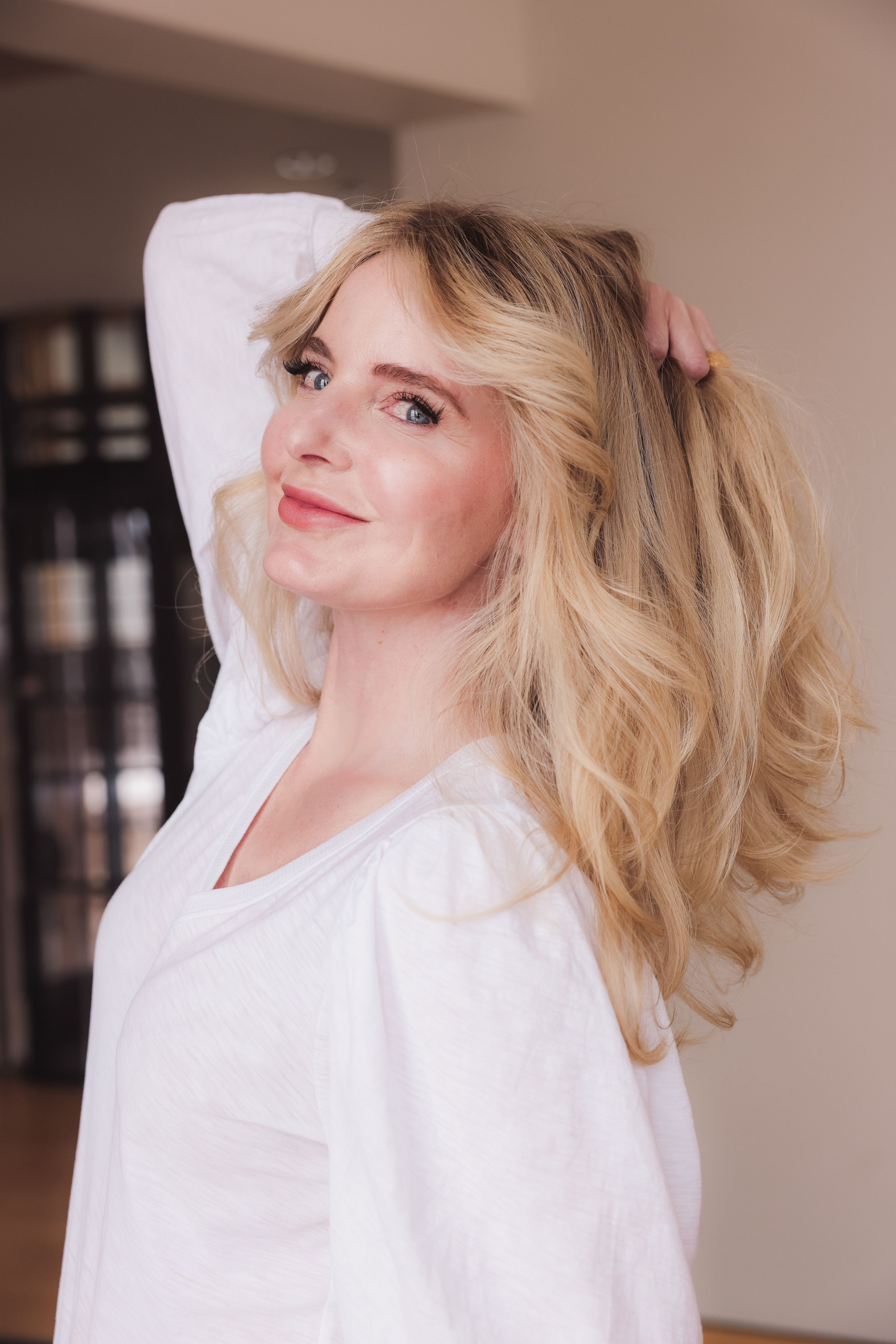Menopause marks a significant phase in a woman’s life, often accompanied by a whirlwind of changes, both physical and emotional. As we go through menopause and our hormone levels fluctuate, our body and mind go through some serious transformations. The symptoms that come along with menopause range from mild to downright terrible…we’re not going to sugarcoat it! The menopause “journey” is really more like a menopause “rollercoaster” that we did not ask to be on and is not fun at all. Many women talk about the more common symptoms like hot flashes and mood swings. But one topic we tend to skip over is the impact it has on our hair. In this post, we’re diving into this less-discussed menopause symptom, shedding light on why these hair changes happen, and giving a few tips on how to manage the change to maintain healthy and happy hair during this transitional phase of life.

Menopause Hair Changes
We all know that during menopause, your estrogen and progesterone production decreases. The drop in estrogen levels is what causes most of the symptoms of menopause…including many possible hair changes. Every woman is different, but the most common menopause hair changes include hair thinning, shedding, loss of fullness, slow or loss of growth, texture differences, dryness, and brittleness. The tricky part in deciphering these changes is that there are often other factors that can cause hair changes during menopause too, like stress, illness, lack of nutrients, etc. Plus, your estrogen levels fluctuate…which means your hair may look incredible and healthy sometimes, but it could look thin and dull at other times. Isn’t it sooo fun being a woman?! We’re sharing a few ways to deal with hair changes during menopause below…

How to Deal with Hair Changes During Menopause
Manage Stress
It’s important to note that our bodies, our hormones, and our experiences are all so different. What works for your best friend may not work for you. Don’t get discouraged…there is a solution out there for you, you just have to look for it. Which can be the difficult and stressful part. Especially when you feel like nothing is working. This is easier said than done but, it’s important to manage your stress. When estrogen levels drop, cortisol (the stress hormone) levels may rise, which triggers more stress. Increased cortisol levels combined with everything else going on during menopause is a recipe for high stress. Manage your stress by regularly moving your body, meditation, journaling, talking to a therapist, or whatever helps you manage your stress. Other things that can help with stress and other general menopause symptoms are eating a balanced diet, staying hydrated, and avoiding any potential triggers (like coffee, spicy food, alcohol, etc.).

Go Natural
The less you can do to your hair, the better. That doesn’t mean you should let it go completely. But a few things you can do include…
Use less heat on your hair – At a time when your hair is already brittle or fine, using less heat on it will keep it looking healthier. We know this isn’t ideal so if you have to use heat, consider not drying and curling your hair on the same day. We know that sometimes it’s unavoidable. But if you want to reduce damage, it’s best to avoid drying and curling your hair on the same day! The extra heat makes it more damaged, brittle, and dry.
Avoid using extensions in your hair – If your hair is getting thinner, you may feel the urge to get extensions to make it look longer and thicker. But extensions can actually weaken and damage your hair.
Be aware of dyes and chemicals – We aren’t saying you shouldn’t dye your hair anymore. But if you’re on a healthier hair journey and really want to try absolutely everything to keep your hair healthy, consider not dyeing your hair. If you do dye it, find a salon that uses all-natural hair dye since the chemicals in regular dye can damage your scalp and hair.

Combat the Menopause Hair Loss
Another common menopause hair change is hair loss and shedding. There are a few routes you can take to combat this…
Take Biotin – This is a really common supplement you can take for your hair, skin, and nails. It’s likely that your daily multivitamin already has biotin in it so make sure you check that first. But as always, make sure you talk to your doctor before trying something new. Biotin is tricky with thyroid meds so again talk to your doctor before taking it.
Additional Supplements – There are SO many options out there that claim to help with hair health. People really LOVE Nutrafol and have seen great results. Erin ordered one bottle, but couldn’t commit to the four pills per day. It felt like too much for her, but if you are open to trying it, it is highly rated and people say it really makes their hair grow and improves thickness and dullness! Another highly recommended brand is Welbel.
Thickening Treatments – Basically…fake it til you make it. If you’re experiencing hair loss and need some volume, you can use products like thickening shampoo, thickening conditioner, thickening mousse, thickening serum…you get the picture! Multiple Team Busbee members use this Bumble & Bumble Thickening Spray and it really works!
Collagen Powder – Erin says that her thyroid meds (more on that below) coupled with collagen powder in her morning coffee have literally CHANGED her life!! Most of Team Busbee uses it now and can agree that consistently using collagen powder really helps our hair look and feel better, thicker, shinier, etc.
If you haven’t already, make sure you watch Erin’s video on how to get thicker hair here with tons of great tips!

Be Gentle on Fine Hair
If your hair is already fine, damaged, broken, or brittle…be gentle with it. Make sure you switch your hairbrush to one that minimizes breakage and is gentler on your hair. This one has great reviews. If you like to wear your hair up, use silky, non-pull hair ties, and make sure to do a loose hairstyle so you aren’t straining your hair in a tight bun or ponytail.
Another way to take care of your hair is to get regular trims. Just like we need daily exercise to keep our energy levels up, regular trims are important to keep up with hair maintenance, hair growth, and getting rid of damaged ends. Make sure you get your hair trimmed every 6-8 weeks to keep it healthy, growing, and thick!

Treat Texture Changes & Dullness
Hair Masks – Hair masks can make a HUGE difference for your hair’s texture and shine. You should do a hair mask at least once a week. Erin’s favorite is the Obliphica hair mask but there are so many options out there. We also love the Briogeo deep conditioning mask.
Good Shampoo & Conditioner – Make sure you’re using a good shampoo and conditioner. A few Team Busbee members love the Davines brand and that each of their shampoo/conditioners tackles a specific problem. For example, Erin uses the Nounou shampoo/conditioner that treats brittle hair while Kaitlyn uses the Momo shampoo/conditioner that treats dry hair. They have a shampoo/conditioner for every type of hair from stick-straight to super curly hair. Erin has also tried and likes Colleen Rothschild’s haircare products and the highly-rated Olaplex shampoo and conditioner.
Don’t Use Too Many Products – I know…we’ve offered a lot of advice that involves using different products already! But using too many products can weigh your hair down and all of those products can build up. If you have to use a bunch of products, make sure you have a clarifying or detoxing shampoo to help get rid of the buildup like Quai Detox Shampoo. If you want to DIY it, try adding a capful of apple cider vinegar to your regular shampoo.

Treat Your Scalp
We’ve talked a lot about your actual hair but haven’t touched too much on the literal root of the issue…your scalp! An unhealthy scalp can affect hair and hair follicles. And one big hair change symptom for menopausal women is having an itchy and/or sensitive scalp. If you’re experiencing that, there are tons of scrubs and serums out there that you can try. The Divi scalp serum gets amazing reviews and a Team Busbee member said she loves it! We linked a few options below…

Seek Professional Help
If you feel like you’ve tried everything or you’re just extremely tired of the frustrating symptoms of menopause, make sure you’re talking to your doctor! There are so many options out there now and you don’t have to suffer through it. It’s also worth noting that depending on your age, it’s important to make sure you’re on top of your thyroid. After Erin had her daughter, her hair got super thin, and she thought it was just a post-pregnancy thing. Turns out, it was actually a problem with her thyroid. She has hypothyroidism and had to start taking medication. After she started that, in combination with collagen powder, her hair got a LOT thicker and she saw noticeable hair growth.
Erin shared more about her early menopause signs and symptoms in this post about seven (yes, 7!) years ago if you’re interested. It’s a very old and personal post and Erin has learned quite a bit along the way so if you’re interested in more of her recent posts and videos, you can find those here and here. If you’re still really new to this journey, we recommend reading this article from Oprah Daily that’s really helpful and informative.
Don’t forget that you can get posts delivered directly to your inbox by subscribing to the newsletter. You also get access to tons of free resources like wardrobe basics checklists, lookbooks, and more!
Thanks for stopping by!
![]()





Thank you Erin and your team for another wonderful article. Menopause has been kicking my butt (literall?). I am also on thyroid medication so I get what you are going through but the hair loss has been the most difficult to manage. Thank you for your dow. To earth clothing tips and in general your love for women to take care of themselves AND live themselves.
Sending you SO much love and strength right now, Tricia. This journey is HARD, but you are not alone. Hope this tips offer some help to you! ~Team Busbee